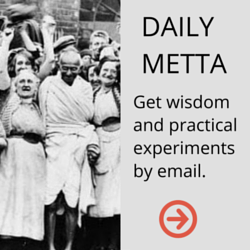June 3:
 “Every good movement passes through five stages: indifference, ridicule, abuse, repression and respect.”
“Every good movement passes through five stages: indifference, ridicule, abuse, repression and respect.”
–Gandhi (Young India, March 9, 1921)
Many of us take for granted that a nonviolent movement will be immediately respected, but its most important — and lasting — effects are in the way our collective consciousness is awakened when we face the odds and stay the course. Gandhi maintained that only in nonviolence can you lose all of the battles and go on to win the war, and therefore if we give up too early, we lose it all! “Sorry, I tried nonviolence and it wasn’t working.” “Oh really?” Gandhi might reply.
To strengthen our understanding of our power, we have to cultivate our long-term and deeper vision of how nonviolence works. At Metta, we like to talk about “work” versus work, a formula articulated by Michael Nagler. It goes like this: Violence sometimes “works” but it never works; and nonviolence sometimes “works” but it always works. In other words, in nonviolence, you don’t always attain what you set out to achieve, it does not always “work” (note use of quotes), but in the long term, it always works, it infuses positive, constructive energy into a situation, whose ripples will be felt not immediately but down the road. Nonviolence encourages, if not compels us to have faith in that powerful undercurrent that points us down the path to movement success, even if we think it’s “not working.”
Experiment in Nonviolence:
Think of a time when you thought a kind word or gesture, or a more developed nonviolent act, did not “work” but there were good results later on whose connection with your act may not have been obvious.
 Daily Metta 2015, a service of the Metta Center for Nonviolence, is a daily reflection on the strategic and spiritual insights of Mahatma Gandhi in thought, word and deed. As Gandhi called his life an “experiment in truth,” we have included an experiment in nonviolence to accompany each Daily Metta. Check in every day for new inspiration. Each year will be dedicated to another wisdom teacher.
Daily Metta 2015, a service of the Metta Center for Nonviolence, is a daily reflection on the strategic and spiritual insights of Mahatma Gandhi in thought, word and deed. As Gandhi called his life an “experiment in truth,” we have included an experiment in nonviolence to accompany each Daily Metta. Check in every day for new inspiration. Each year will be dedicated to another wisdom teacher.









I so wish violent words were not being used to describe peace work. Violent language (war, battle, fight, etc.) is the language if the corporate state.